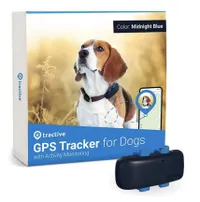10 ways to calm your dog during fireworks
Looking for ways to calm your dog during fireworks? These vet-approved tips are just what you need.
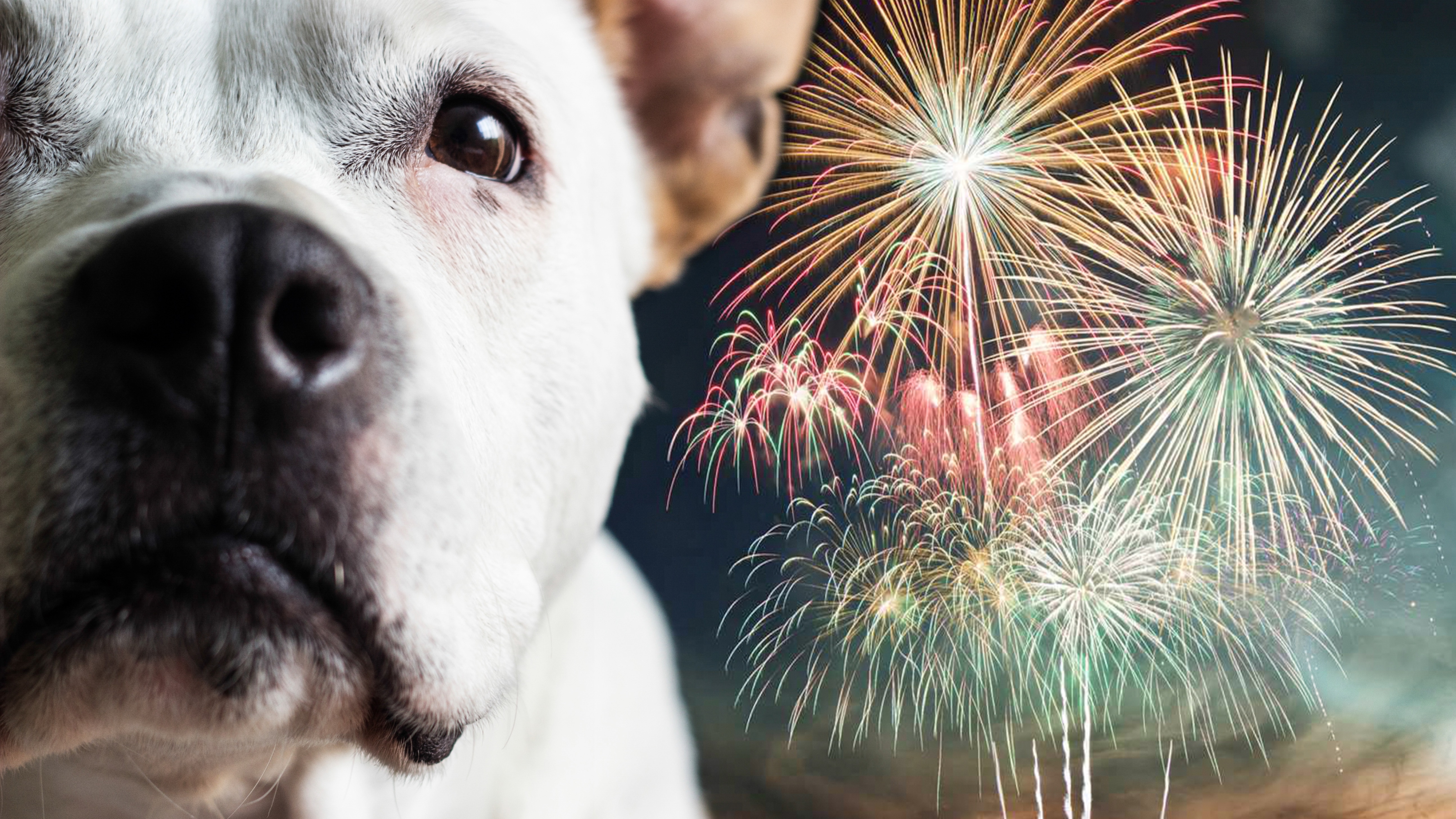
Get the best advice, tips and top tech for your beloved Pets
You are now subscribed
Your newsletter sign-up was successful
If you’re looking for ways to calm your dog during fireworks, rest assured — we’ve got you covered! While many of us humans can’t get enough of all those bright lights filling the night sky, for our canine companions, it can be a very different story.
As pet parents, most of us are always trying to do our best when it comes to looking after our dogs' health and wellbeing. But what we don’t often realize is that during periods of peak stress and anxiety, the best dog treats alone are usually not enough to help our pups stay calm.
Fireworks can be particularly challenging given how noisy they are. “With a dog’s sensitive hearing, fireworks can be painfully loud,” Dr. Joanna Woodnutt affirms. “Couple this with the fact they don’t know where they’re coming from, and the unpredictability of the noises, and firework fear makes a lot of sense.”
The good news is there are some simple things you can do to help make this time easier on your fur friend. Knowing how to calm a dog during periods of high anxiety takes a bit of advance planning, but together with Dr. Woodnutt, we’ve come up with some effective tips to help your canine stay calm this fireworks season. Let’s dive in…

After graduating as a veterinarian from the University of Nottingham, Dr Joanna Woodnutt went on to practice companion animal medicine in the Midlands. She quickly developed a love of consulting and helping clients with medical problems such as dermatology, behaviour and nutrition - anything that involved helping clients understand their pets better. Jo started writing about pet health in 2017, realising that it meant she could help even more pet parents.
Ways to calm your dog during fireworks
1. Create an action plan
Fireworks season isn't usually a constant barrage of loud bangs and flashing lights. The number of fireworks zooming into the sky will peak around specific occasions so create a diary, noting when fireworks are more likely – perhaps around Thanksgiving and New Year's Eve, Bonfire Night and Diwali.
It's useful to scour social media, check local newspaper websites and join a community WhatsApp group to see when firework parties are being arranged. You should also talk to neighbors about any concerns you have, in the hope they'll agree to some time limits.
Get the best advice, tips and top tech for your beloved Pets
Once you know when fireworks are likely to be more intense, you can then take action. For example, you will need to adjust the time you allow your dog to go to the toilet so that it won't coincide with the fireworks. It's also a good idea to feed your dog well before the fireworks start. Opt for the best dog food which is rich in complex carbohydrates or try some healthy homemade dog food recipes a few hours before your pooch is due to go to sleep. This can help put their body in a more relaxed and restful state and aid sleep.
2. Make sure they're very tired
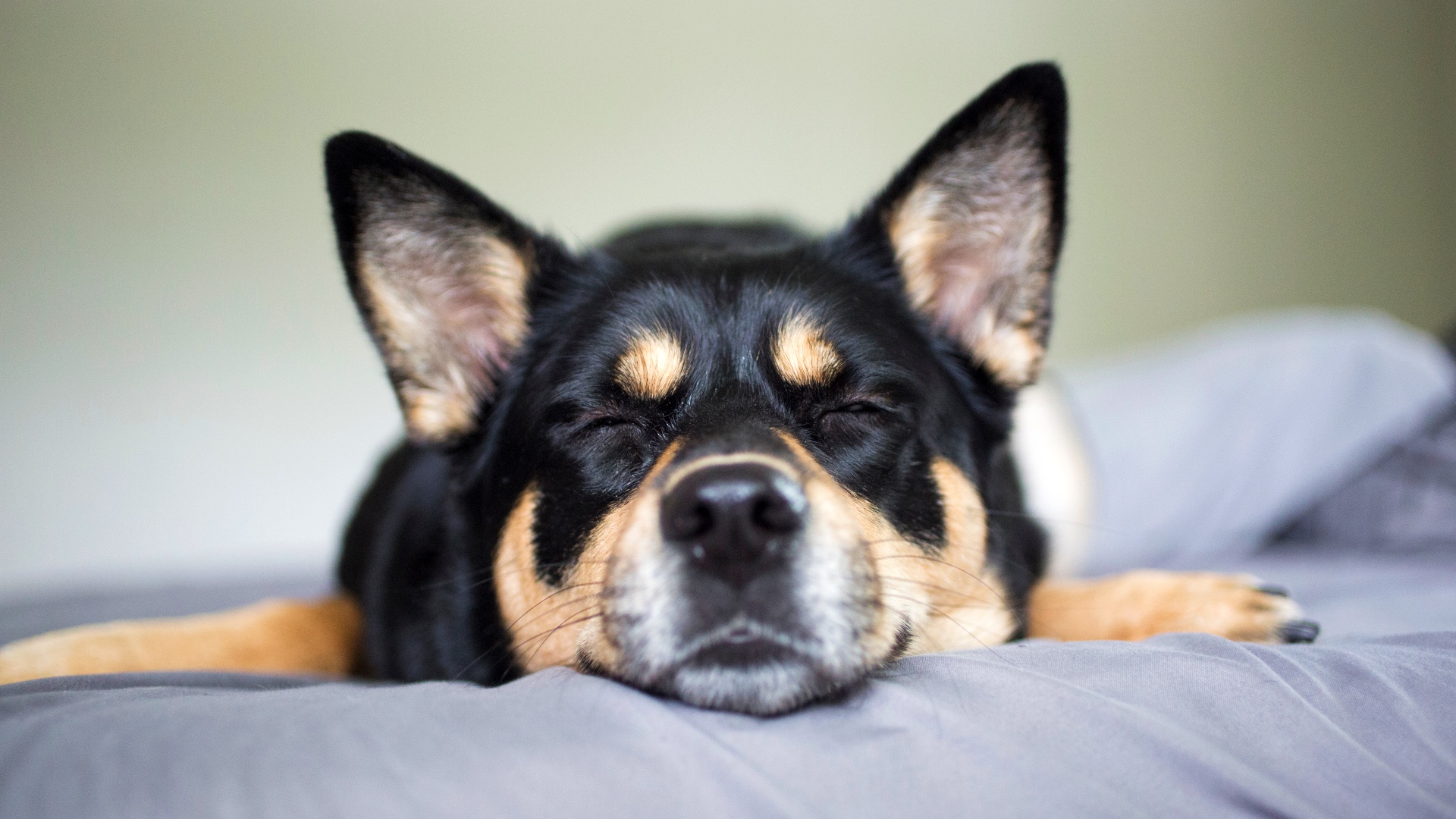
Ideally, you want your dog to be sleepy or, preferably, asleep when the fireworks start. You can aid this by ensuring your dog is exercised on a lead or on one of the best dog harnesses during the late afternoon. The idea is they'll be sleepier when the fireworks are let off, which means there's less chance of your dog hearing them and becoming freaked out.
“Dog phobia signs range from mild (pacing, whining, inappetence) to severe (shaking, aggression, loss of bowel control),” says Dr Woodnutt. “Most dogs are thankfully at the mild end of the spectrum, but repeated exposure over the years can make them worse.” Trying to get them to sleep through the worst of it will go a long way towards shielding them from the noise.
3. Keep your dog indoors
One thing's for sure, don't take your dog out when the fireworks are filling the sky. “Even if your dog isn’t normally scared of fireworks, being this close to them may sensitise them to the noise,” Dr Woodnutt says. “If your dog is already scared of fireworks, taking them nearby is cruel – they will be terrified. There is a high chance they’ll slip the lead and escape, risking being hit by a car or getting lost.”
Instead, keep all the curtains and windows closed to muffle the noise and, if your dog needs the toilet, take them out on a lead unless you have a very secure property that they can’t escape from. At no point should you ever allow your furry friend to go outdoors unsupervised when fireworks are being let off.
4. Ensure your dog feels safe
You need to make the home environment comfortable, safe and stress-free. Start by investing in a good quality dog bed so they begin to feel at ease and ensure your pooch has access to the best dog toys and a long-lasting chew – these give a pup something distracting to focus on. Location also becomes vital in this instance.
If you have somewhere particularly quiet, for example, then locate the bed there – this could be a large closet or a basement, for example. Don't worry too much if they are able to see some of the light from the fireworks, though. “Most dogs are not as frightened of the lights, so silent fireworks aren’t scary to them,” says Dr Woodnutt. “However, every dog is different, and unexplained flashing lights are sure to be a trigger for some.”
SmartPetLove Snuggle Puppy
$39.95 from Amazon
Snuggle Puppy is a wonderful toy for dogs struggling with anxiety. It features a real-feel heartbeat that can be set to one of two modes — continuous or eight hours with auto off. A calming and supportive sleep aid, it's ideal for reducing stress and helping your dog relax.
5. Let them have access to their usual areas in your home
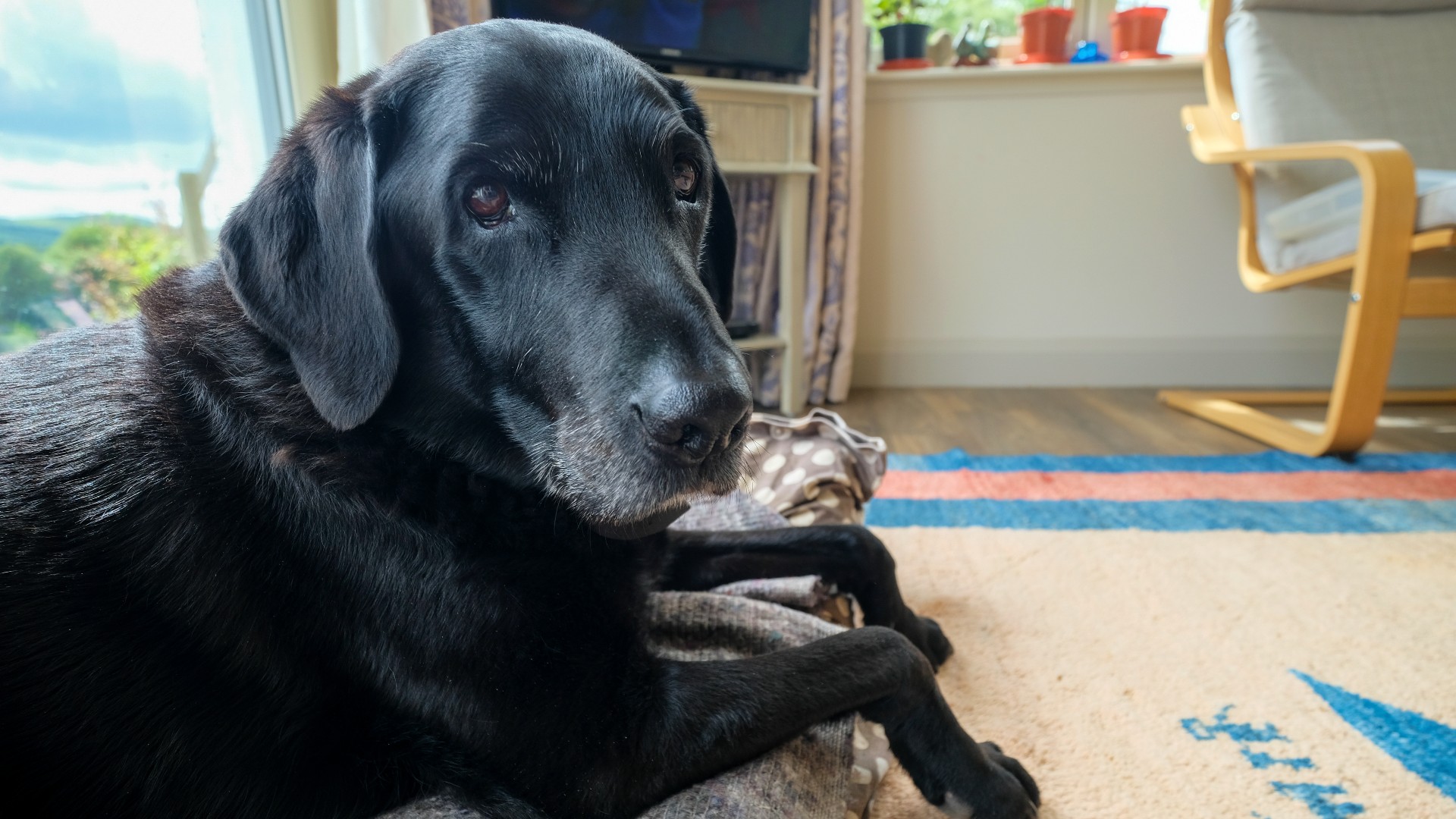
Try not to confine your dog to one space, though. You don't want to make your canine friend feel trapped because that could lead to anxiety in dogs. What's more, if your pet can't see that you're around, it could also result in separation anxiety.
Instead, allow your dog to roam about all the usual areas of your home and avoid crating them when the fireworks are going off. Consider allowing your dog to sleep in your bedroom, too.
6. Reassure your furry friend that there’s nothing to worry about
A chilled-out human can go a long way in creating a chilled-out dog, so use your behavior to reassure your pup that the fireworks are no big deal. Your dog will look to you to see how you’re responding to all the noise, so keep your tone of voice soothing and they’ll immediately feel more relaxed. At the same time, pay your pooch lots of attention and learn dog body language to spot signs of stress.
7. Play soothing sounds
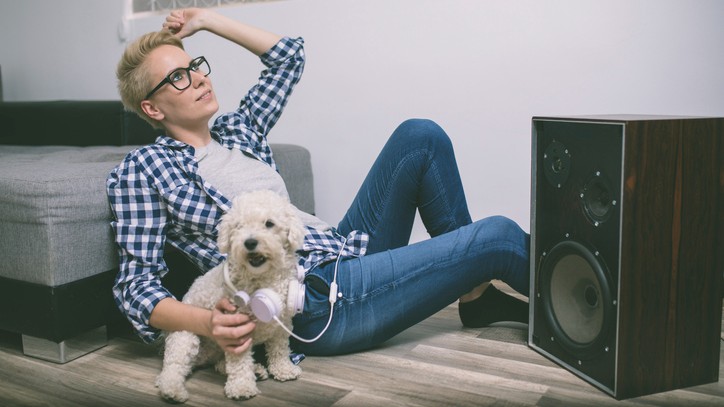
There is strong evidence suggesting dogs react positively to relaxing music when they're living in a stressful environment. In a study published in the Journal of Veterinary Behavior in 2012, researchers evaluated the behavior of 117 shelter dogs who were exposed to a mix of classical and heavy metal music and found that classical music had a significant calming effect.
During fireworks season, why not try listening to the Classic FM Music for Pets playlist — it works wherever you are in the world. Allowing your dog to listen to the tracks when the fireworks are going off, may work wonders. Playing white noise, such as nature sounds, has also been proven to be beneficial.
8. Distract your dog
Distracting your dog when they’re feeling stressed or anxious can be a great tactic and the goal is to keep them occupied for as long as possible so their attention is on something other than the noise going on outside.
The best longest lasting dog chews are ideal for giving your pup something to focus on and many of them are designed to last for several hours, which means your canine companion will be too busy gnawing away on their treat to pay too much attention to the fireworks.
Ecokind Himalayan Dog Chews
$20.77 at Amazon
Free from chemicals and preservatives, these 100% natural chews are easy to digest, odorless and contain no gluten or grains. Ideal for aggressive chewers, they're flavorful, nutritious and will keep your pup occupied for hours.
9. Invest in a pet tracker
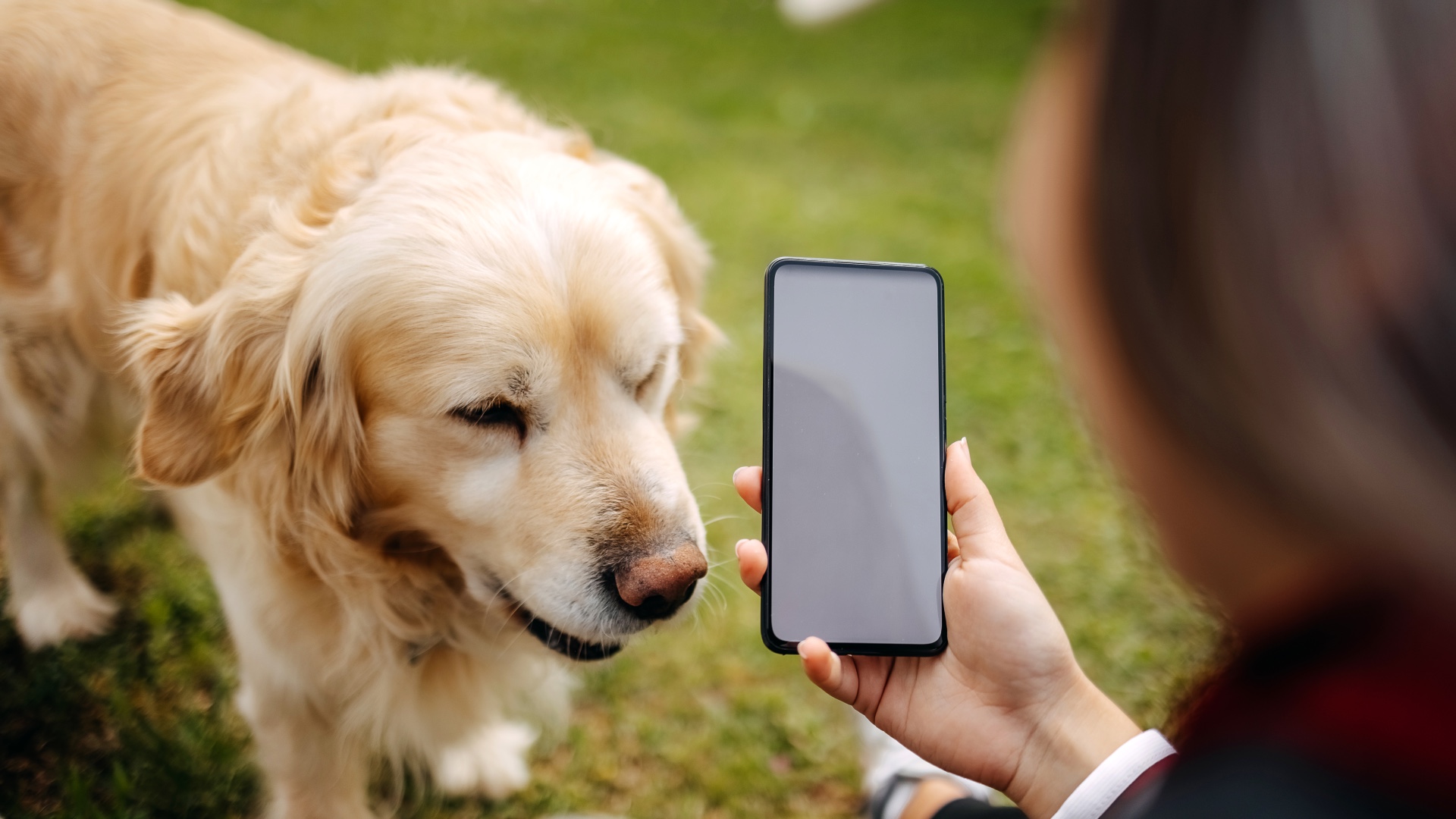
If you keep your dog inside when the fireworks are going off, then you should be able to keep your pooch safe and sound. There is a chance, however, that your dog will seek to run away from your home during this period so you'll need a way to quickly find your pet.
Take a look at the best pet trackers – they give you an accurate and up-to-the-minute location of your canine. Make sure your dog is microchipped and wearing an ID tag, too. This will make it easy for your pet to be returned to you quickly in the event of a house break!
Tractive GPS Tracker for Dogs
$34.99 from Amazon
Keep tabs on your pup 24/7 with this tracker that gives you updates on their location in real time. Great for providing you with peace of mind, it also doubles up as an activity tracker, so you can monitor your dog's health and fitness, too!
10. Desensitize your dog to the sound of fireworks
Finally, you may want to work on desensitizing your dog during firework season. “Some people advocate for ‘flooding’ – when you expose them to their fear in the hope they overcome it when they realise nothing bad happens,” says Dr Woodnutt.
“Unfortunately, flooding doesn’t work and exposing terrified dogs to their phobias is a welfare issue. Instead, working with a qualified behaviourist to desensitise them slowly over time is the best way to handle firework fear.”
One way you could do this – treading carefully – is by finding a YouTube video containing firework noises and playing it at the lowest possible volume, so that it’s barely audible. Increase the volume slowly and leave it for several minutes.
Then turn it up a little more so that's audible but not loud. Leave it for between five and 10 minutes, repeating the process three to four times each day. Just be sure to turn the sound off as soon as you fear your dog is showing signs of stress. Using dog treats to reward your pup throughout the process can create a positive connection.
Read next: how to survive the 4th of July with an anxious dog

Kathryn is a freelance writer who has been a member of the PetsRadar family since it launched in 2020. Highly experienced in her field, she's driven by a desire to provide pet parents with accurate, timely, and informative content that enables them to provide their fur friends with everything they need to thrive.
Kathryn works closely with vets and trainers to ensure all articles offer the most up-to-date information across a range of pet-related fields, from insights into health and behavior issues to tips on products and training.
When she’s not busy crafting the perfect sentence for her features, buying guides and news pieces, she can be found hanging out with her family (which includes one super sassy cat and a kitten), drinking copious amounts of Jasmine tea and reading all the books.
She has written for a range of publications, including Fit&Well, Top Ten Reviews, LiveScience, Goodto, and Product Hunt.
- David CrookesFreelance writer
- Dr Joanna Woodnutt MRCVSVet


